University of East London EC4006: Brexit's Impact on Construction
VerifiedAdded on 2023/01/12
|11
|2434
|67
Essay
AI Summary
This essay analyzes the impact of Brexit on the UK construction industry, focusing on the economic consequences of the UK's departure from the European Union. The introduction outlines the context of Brexit and its potential effects on various industries, highlighting the importance of trade agreements, labor force changes, and inflation. The main body delves into the consequences of Brexit for both the UK and the EU, discussing the slowdown in economic growth, trade disruptions, and the impact on the financial sector. The essay then specifically examines the construction industry, detailing how Brexit has slowed down construction activities, caused project delays, and created labor shortages. It also explores the challenges related to construction materials, skills gaps, and infrastructure funding. The essay concludes by considering whether government intervention is necessary to address market inefficiencies, suggesting potential strategies such as visa programs for skilled workers, vocational training, and policies to support the construction industry. The references section provides a list of academic sources used in the essay.

Fundamentals of Economy
Paraphrase This Document
Need a fresh take? Get an instant paraphrase of this document with our AI Paraphraser
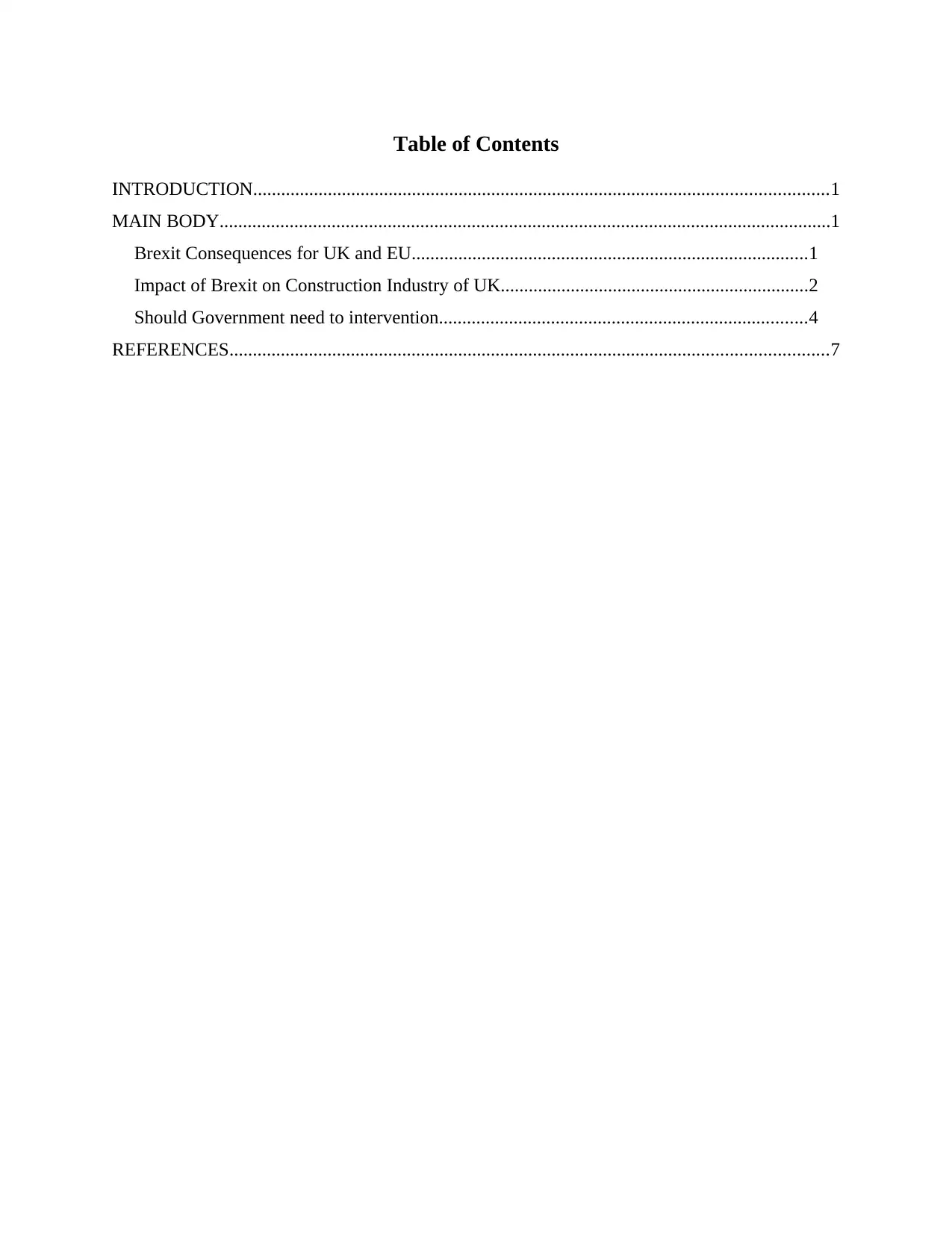
Table of Contents
INTRODUCTION...........................................................................................................................1
MAIN BODY...................................................................................................................................1
Brexit Consequences for UK and EU.....................................................................................1
Impact of Brexit on Construction Industry of UK..................................................................2
Should Government need to intervention...............................................................................4
REFERENCES................................................................................................................................7
INTRODUCTION...........................................................................................................................1
MAIN BODY...................................................................................................................................1
Brexit Consequences for UK and EU.....................................................................................1
Impact of Brexit on Construction Industry of UK..................................................................2
Should Government need to intervention...............................................................................4
REFERENCES................................................................................................................................7

⊘ This is a preview!⊘
Do you want full access?
Subscribe today to unlock all pages.

Trusted by 1+ million students worldwide
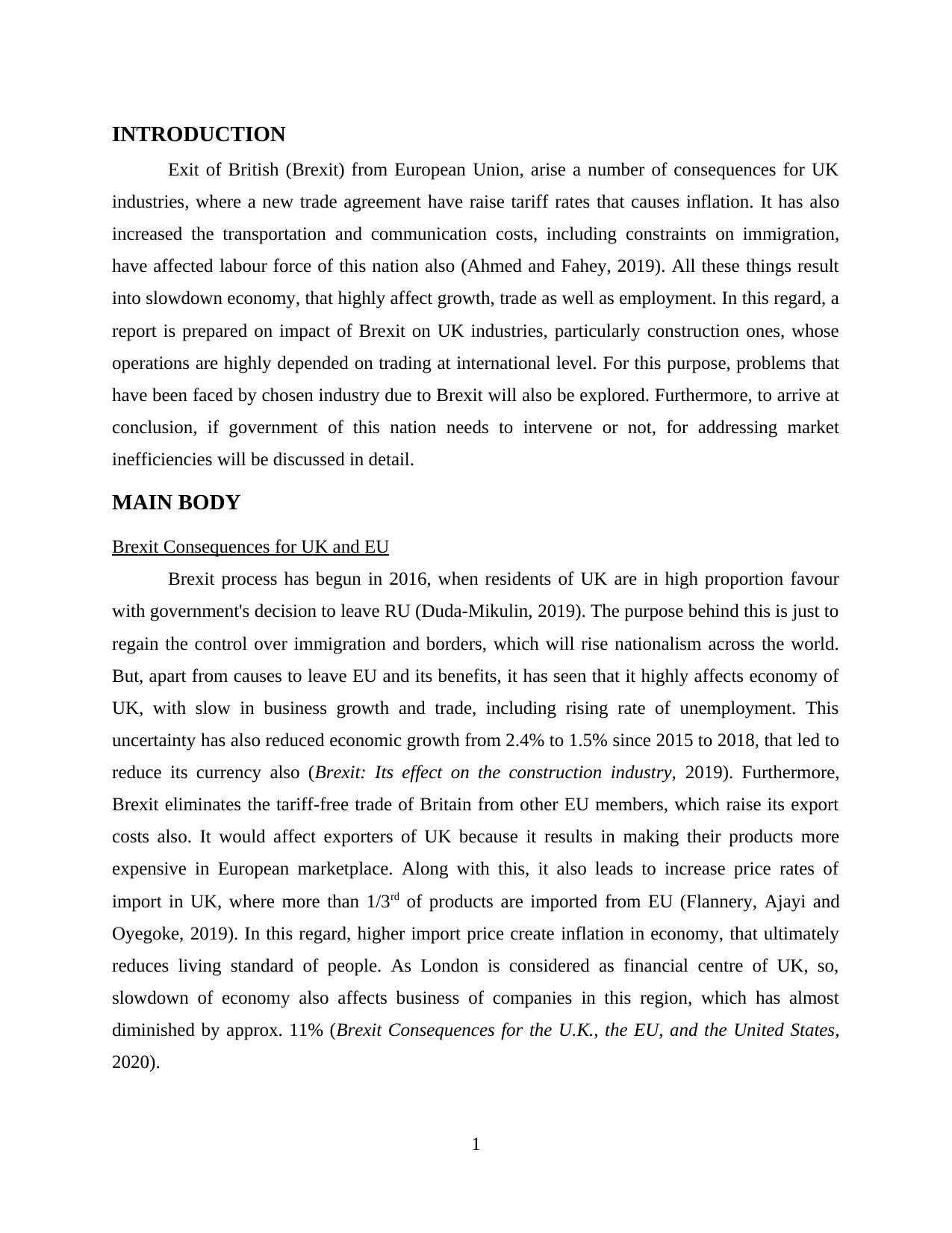
INTRODUCTION
Exit of British (Brexit) from European Union, arise a number of consequences for UK
industries, where a new trade agreement have raise tariff rates that causes inflation. It has also
increased the transportation and communication costs, including constraints on immigration,
have affected labour force of this nation also (Ahmed and Fahey, 2019). All these things result
into slowdown economy, that highly affect growth, trade as well as employment. In this regard, a
report is prepared on impact of Brexit on UK industries, particularly construction ones, whose
operations are highly depended on trading at international level. For this purpose, problems that
have been faced by chosen industry due to Brexit will also be explored. Furthermore, to arrive at
conclusion, if government of this nation needs to intervene or not, for addressing market
inefficiencies will be discussed in detail.
MAIN BODY
Brexit Consequences for UK and EU
Brexit process has begun in 2016, when residents of UK are in high proportion favour
with government's decision to leave RU (Duda-Mikulin, 2019). The purpose behind this is just to
regain the control over immigration and borders, which will rise nationalism across the world.
But, apart from causes to leave EU and its benefits, it has seen that it highly affects economy of
UK, with slow in business growth and trade, including rising rate of unemployment. This
uncertainty has also reduced economic growth from 2.4% to 1.5% since 2015 to 2018, that led to
reduce its currency also (Brexit: Its effect on the construction industry, 2019). Furthermore,
Brexit eliminates the tariff-free trade of Britain from other EU members, which raise its export
costs also. It would affect exporters of UK because it results in making their products more
expensive in European marketplace. Along with this, it also leads to increase price rates of
import in UK, where more than 1/3rd of products are imported from EU (Flannery, Ajayi and
Oyegoke, 2019). In this regard, higher import price create inflation in economy, that ultimately
reduces living standard of people. As London is considered as financial centre of UK, so,
slowdown of economy also affects business of companies in this region, which has almost
diminished by approx. 11% (Brexit Consequences for the U.K., the EU, and the United States,
2020).
1
Exit of British (Brexit) from European Union, arise a number of consequences for UK
industries, where a new trade agreement have raise tariff rates that causes inflation. It has also
increased the transportation and communication costs, including constraints on immigration,
have affected labour force of this nation also (Ahmed and Fahey, 2019). All these things result
into slowdown economy, that highly affect growth, trade as well as employment. In this regard, a
report is prepared on impact of Brexit on UK industries, particularly construction ones, whose
operations are highly depended on trading at international level. For this purpose, problems that
have been faced by chosen industry due to Brexit will also be explored. Furthermore, to arrive at
conclusion, if government of this nation needs to intervene or not, for addressing market
inefficiencies will be discussed in detail.
MAIN BODY
Brexit Consequences for UK and EU
Brexit process has begun in 2016, when residents of UK are in high proportion favour
with government's decision to leave RU (Duda-Mikulin, 2019). The purpose behind this is just to
regain the control over immigration and borders, which will rise nationalism across the world.
But, apart from causes to leave EU and its benefits, it has seen that it highly affects economy of
UK, with slow in business growth and trade, including rising rate of unemployment. This
uncertainty has also reduced economic growth from 2.4% to 1.5% since 2015 to 2018, that led to
reduce its currency also (Brexit: Its effect on the construction industry, 2019). Furthermore,
Brexit eliminates the tariff-free trade of Britain from other EU members, which raise its export
costs also. It would affect exporters of UK because it results in making their products more
expensive in European marketplace. Along with this, it also leads to increase price rates of
import in UK, where more than 1/3rd of products are imported from EU (Flannery, Ajayi and
Oyegoke, 2019). In this regard, higher import price create inflation in economy, that ultimately
reduces living standard of people. As London is considered as financial centre of UK, so,
slowdown of economy also affects business of companies in this region, which has almost
diminished by approx. 11% (Brexit Consequences for the U.K., the EU, and the United States,
2020).
1
Paraphrase This Document
Need a fresh take? Get an instant paraphrase of this document with our AI Paraphraser
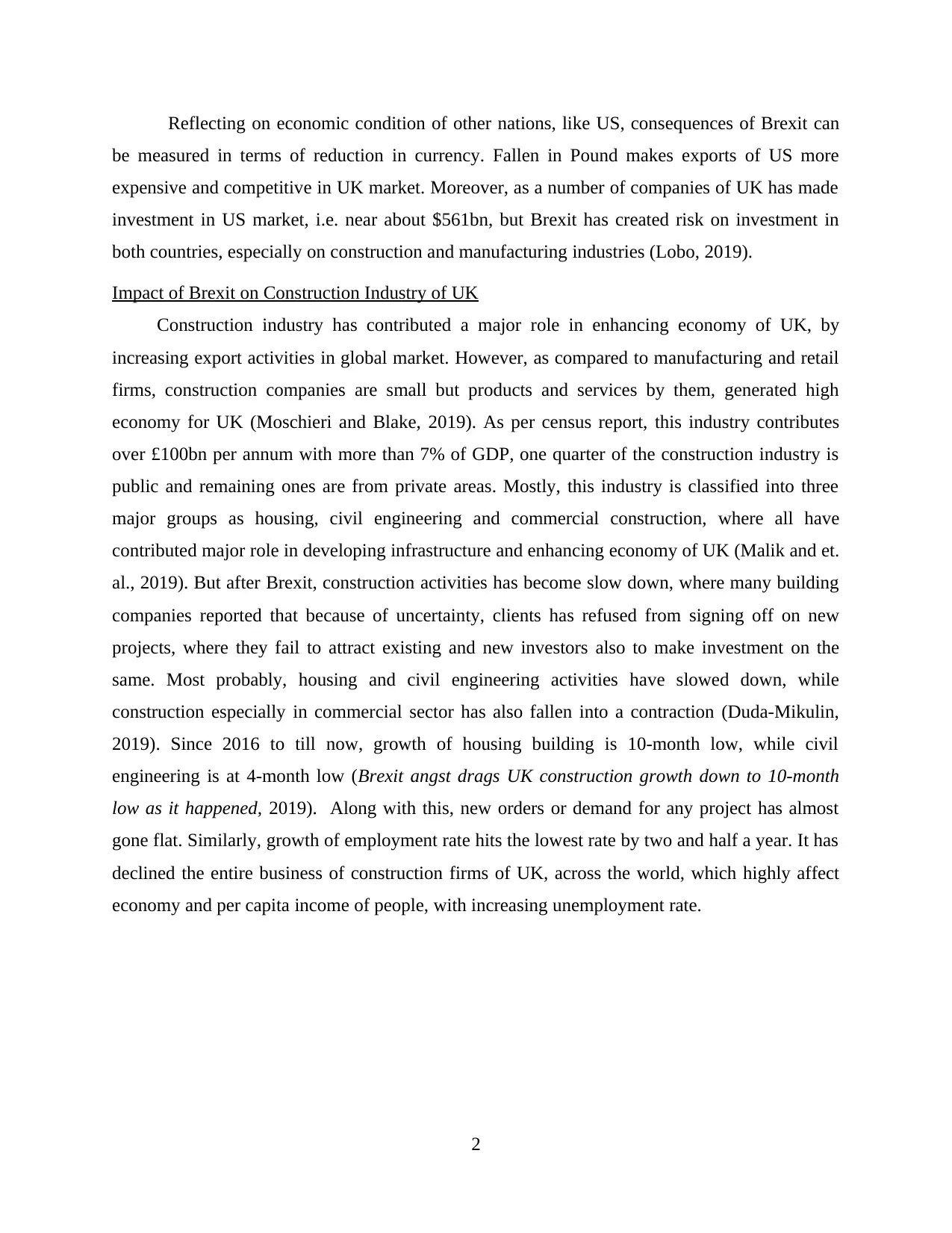
Reflecting on economic condition of other nations, like US, consequences of Brexit can
be measured in terms of reduction in currency. Fallen in Pound makes exports of US more
expensive and competitive in UK market. Moreover, as a number of companies of UK has made
investment in US market, i.e. near about $561bn, but Brexit has created risk on investment in
both countries, especially on construction and manufacturing industries (Lobo, 2019).
Impact of Brexit on Construction Industry of UK
Construction industry has contributed a major role in enhancing economy of UK, by
increasing export activities in global market. However, as compared to manufacturing and retail
firms, construction companies are small but products and services by them, generated high
economy for UK (Moschieri and Blake, 2019). As per census report, this industry contributes
over £100bn per annum with more than 7% of GDP, one quarter of the construction industry is
public and remaining ones are from private areas. Mostly, this industry is classified into three
major groups as housing, civil engineering and commercial construction, where all have
contributed major role in developing infrastructure and enhancing economy of UK (Malik and et.
al., 2019). But after Brexit, construction activities has become slow down, where many building
companies reported that because of uncertainty, clients has refused from signing off on new
projects, where they fail to attract existing and new investors also to make investment on the
same. Most probably, housing and civil engineering activities have slowed down, while
construction especially in commercial sector has also fallen into a contraction (Duda-Mikulin,
2019). Since 2016 to till now, growth of housing building is 10-month low, while civil
engineering is at 4-month low (Brexit angst drags UK construction growth down to 10-month
low as it happened, 2019). Along with this, new orders or demand for any project has almost
gone flat. Similarly, growth of employment rate hits the lowest rate by two and half a year. It has
declined the entire business of construction firms of UK, across the world, which highly affect
economy and per capita income of people, with increasing unemployment rate.
2
be measured in terms of reduction in currency. Fallen in Pound makes exports of US more
expensive and competitive in UK market. Moreover, as a number of companies of UK has made
investment in US market, i.e. near about $561bn, but Brexit has created risk on investment in
both countries, especially on construction and manufacturing industries (Lobo, 2019).
Impact of Brexit on Construction Industry of UK
Construction industry has contributed a major role in enhancing economy of UK, by
increasing export activities in global market. However, as compared to manufacturing and retail
firms, construction companies are small but products and services by them, generated high
economy for UK (Moschieri and Blake, 2019). As per census report, this industry contributes
over £100bn per annum with more than 7% of GDP, one quarter of the construction industry is
public and remaining ones are from private areas. Mostly, this industry is classified into three
major groups as housing, civil engineering and commercial construction, where all have
contributed major role in developing infrastructure and enhancing economy of UK (Malik and et.
al., 2019). But after Brexit, construction activities has become slow down, where many building
companies reported that because of uncertainty, clients has refused from signing off on new
projects, where they fail to attract existing and new investors also to make investment on the
same. Most probably, housing and civil engineering activities have slowed down, while
construction especially in commercial sector has also fallen into a contraction (Duda-Mikulin,
2019). Since 2016 to till now, growth of housing building is 10-month low, while civil
engineering is at 4-month low (Brexit angst drags UK construction growth down to 10-month
low as it happened, 2019). Along with this, new orders or demand for any project has almost
gone flat. Similarly, growth of employment rate hits the lowest rate by two and half a year. It has
declined the entire business of construction firms of UK, across the world, which highly affect
economy and per capita income of people, with increasing unemployment rate.
2
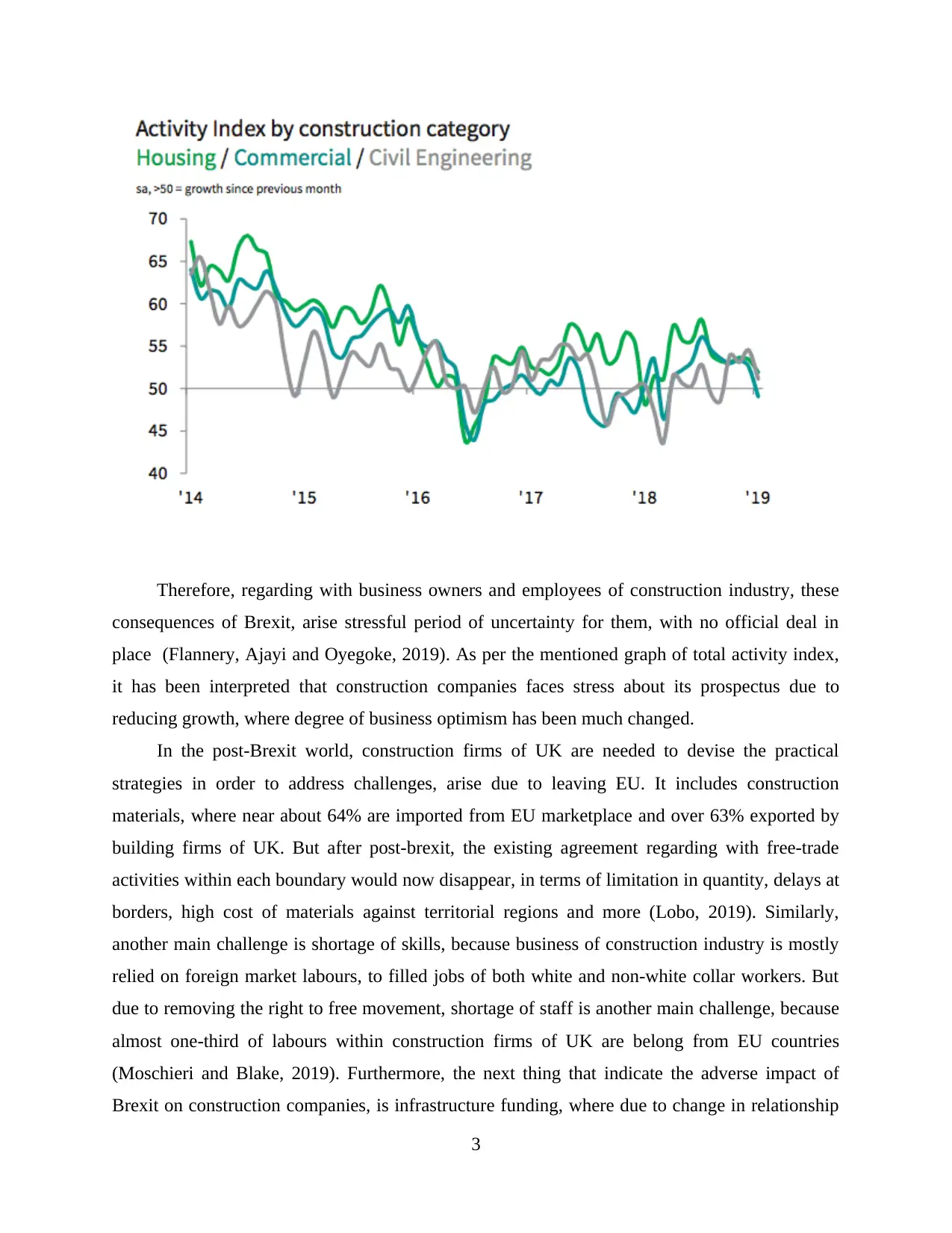
Therefore, regarding with business owners and employees of construction industry, these
consequences of Brexit, arise stressful period of uncertainty for them, with no official deal in
place (Flannery, Ajayi and Oyegoke, 2019). As per the mentioned graph of total activity index,
it has been interpreted that construction companies faces stress about its prospectus due to
reducing growth, where degree of business optimism has been much changed.
In the post-Brexit world, construction firms of UK are needed to devise the practical
strategies in order to address challenges, arise due to leaving EU. It includes construction
materials, where near about 64% are imported from EU marketplace and over 63% exported by
building firms of UK. But after post-brexit, the existing agreement regarding with free-trade
activities within each boundary would now disappear, in terms of limitation in quantity, delays at
borders, high cost of materials against territorial regions and more (Lobo, 2019). Similarly,
another main challenge is shortage of skills, because business of construction industry is mostly
relied on foreign market labours, to filled jobs of both white and non-white collar workers. But
due to removing the right to free movement, shortage of staff is another main challenge, because
almost one-third of labours within construction firms of UK are belong from EU countries
(Moschieri and Blake, 2019). Furthermore, the next thing that indicate the adverse impact of
Brexit on construction companies, is infrastructure funding, where due to change in relationship
3
consequences of Brexit, arise stressful period of uncertainty for them, with no official deal in
place (Flannery, Ajayi and Oyegoke, 2019). As per the mentioned graph of total activity index,
it has been interpreted that construction companies faces stress about its prospectus due to
reducing growth, where degree of business optimism has been much changed.
In the post-Brexit world, construction firms of UK are needed to devise the practical
strategies in order to address challenges, arise due to leaving EU. It includes construction
materials, where near about 64% are imported from EU marketplace and over 63% exported by
building firms of UK. But after post-brexit, the existing agreement regarding with free-trade
activities within each boundary would now disappear, in terms of limitation in quantity, delays at
borders, high cost of materials against territorial regions and more (Lobo, 2019). Similarly,
another main challenge is shortage of skills, because business of construction industry is mostly
relied on foreign market labours, to filled jobs of both white and non-white collar workers. But
due to removing the right to free movement, shortage of staff is another main challenge, because
almost one-third of labours within construction firms of UK are belong from EU countries
(Moschieri and Blake, 2019). Furthermore, the next thing that indicate the adverse impact of
Brexit on construction companies, is infrastructure funding, where due to change in relationship
3
⊘ This is a preview!⊘
Do you want full access?
Subscribe today to unlock all pages.

Trusted by 1+ million students worldwide
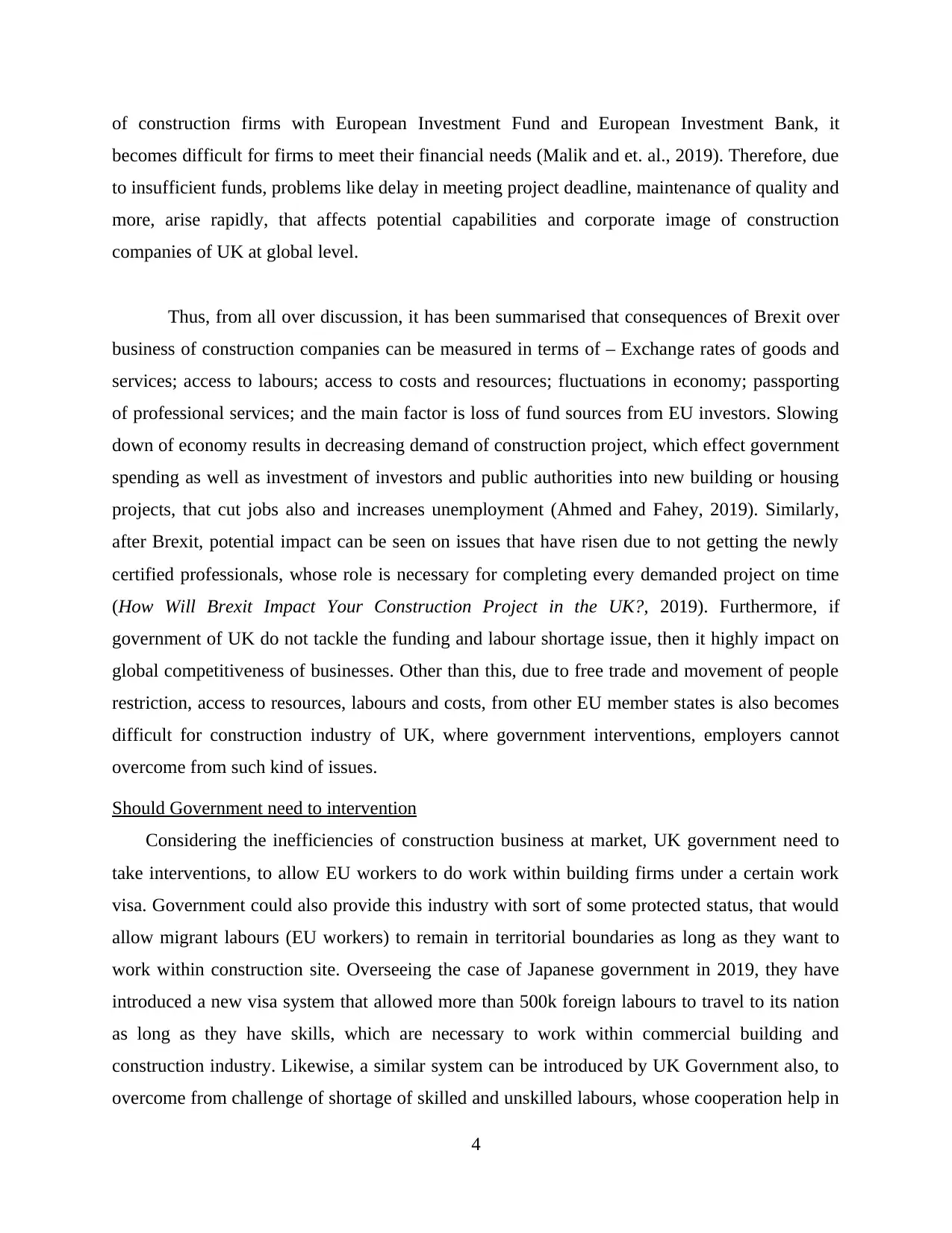
of construction firms with European Investment Fund and European Investment Bank, it
becomes difficult for firms to meet their financial needs (Malik and et. al., 2019). Therefore, due
to insufficient funds, problems like delay in meeting project deadline, maintenance of quality and
more, arise rapidly, that affects potential capabilities and corporate image of construction
companies of UK at global level.
Thus, from all over discussion, it has been summarised that consequences of Brexit over
business of construction companies can be measured in terms of – Exchange rates of goods and
services; access to labours; access to costs and resources; fluctuations in economy; passporting
of professional services; and the main factor is loss of fund sources from EU investors. Slowing
down of economy results in decreasing demand of construction project, which effect government
spending as well as investment of investors and public authorities into new building or housing
projects, that cut jobs also and increases unemployment (Ahmed and Fahey, 2019). Similarly,
after Brexit, potential impact can be seen on issues that have risen due to not getting the newly
certified professionals, whose role is necessary for completing every demanded project on time
(How Will Brexit Impact Your Construction Project in the UK?, 2019). Furthermore, if
government of UK do not tackle the funding and labour shortage issue, then it highly impact on
global competitiveness of businesses. Other than this, due to free trade and movement of people
restriction, access to resources, labours and costs, from other EU member states is also becomes
difficult for construction industry of UK, where government interventions, employers cannot
overcome from such kind of issues.
Should Government need to intervention
Considering the inefficiencies of construction business at market, UK government need to
take interventions, to allow EU workers to do work within building firms under a certain work
visa. Government could also provide this industry with sort of some protected status, that would
allow migrant labours (EU workers) to remain in territorial boundaries as long as they want to
work within construction site. Overseeing the case of Japanese government in 2019, they have
introduced a new visa system that allowed more than 500k foreign labours to travel to its nation
as long as they have skills, which are necessary to work within commercial building and
construction industry. Likewise, a similar system can be introduced by UK Government also, to
overcome from challenge of shortage of skilled and unskilled labours, whose cooperation help in
4
becomes difficult for firms to meet their financial needs (Malik and et. al., 2019). Therefore, due
to insufficient funds, problems like delay in meeting project deadline, maintenance of quality and
more, arise rapidly, that affects potential capabilities and corporate image of construction
companies of UK at global level.
Thus, from all over discussion, it has been summarised that consequences of Brexit over
business of construction companies can be measured in terms of – Exchange rates of goods and
services; access to labours; access to costs and resources; fluctuations in economy; passporting
of professional services; and the main factor is loss of fund sources from EU investors. Slowing
down of economy results in decreasing demand of construction project, which effect government
spending as well as investment of investors and public authorities into new building or housing
projects, that cut jobs also and increases unemployment (Ahmed and Fahey, 2019). Similarly,
after Brexit, potential impact can be seen on issues that have risen due to not getting the newly
certified professionals, whose role is necessary for completing every demanded project on time
(How Will Brexit Impact Your Construction Project in the UK?, 2019). Furthermore, if
government of UK do not tackle the funding and labour shortage issue, then it highly impact on
global competitiveness of businesses. Other than this, due to free trade and movement of people
restriction, access to resources, labours and costs, from other EU member states is also becomes
difficult for construction industry of UK, where government interventions, employers cannot
overcome from such kind of issues.
Should Government need to intervention
Considering the inefficiencies of construction business at market, UK government need to
take interventions, to allow EU workers to do work within building firms under a certain work
visa. Government could also provide this industry with sort of some protected status, that would
allow migrant labours (EU workers) to remain in territorial boundaries as long as they want to
work within construction site. Overseeing the case of Japanese government in 2019, they have
introduced a new visa system that allowed more than 500k foreign labours to travel to its nation
as long as they have skills, which are necessary to work within commercial building and
construction industry. Likewise, a similar system can be introduced by UK Government also, to
overcome from challenge of shortage of skilled and unskilled labours, whose cooperation help in
4
Paraphrase This Document
Need a fresh take? Get an instant paraphrase of this document with our AI Paraphraser
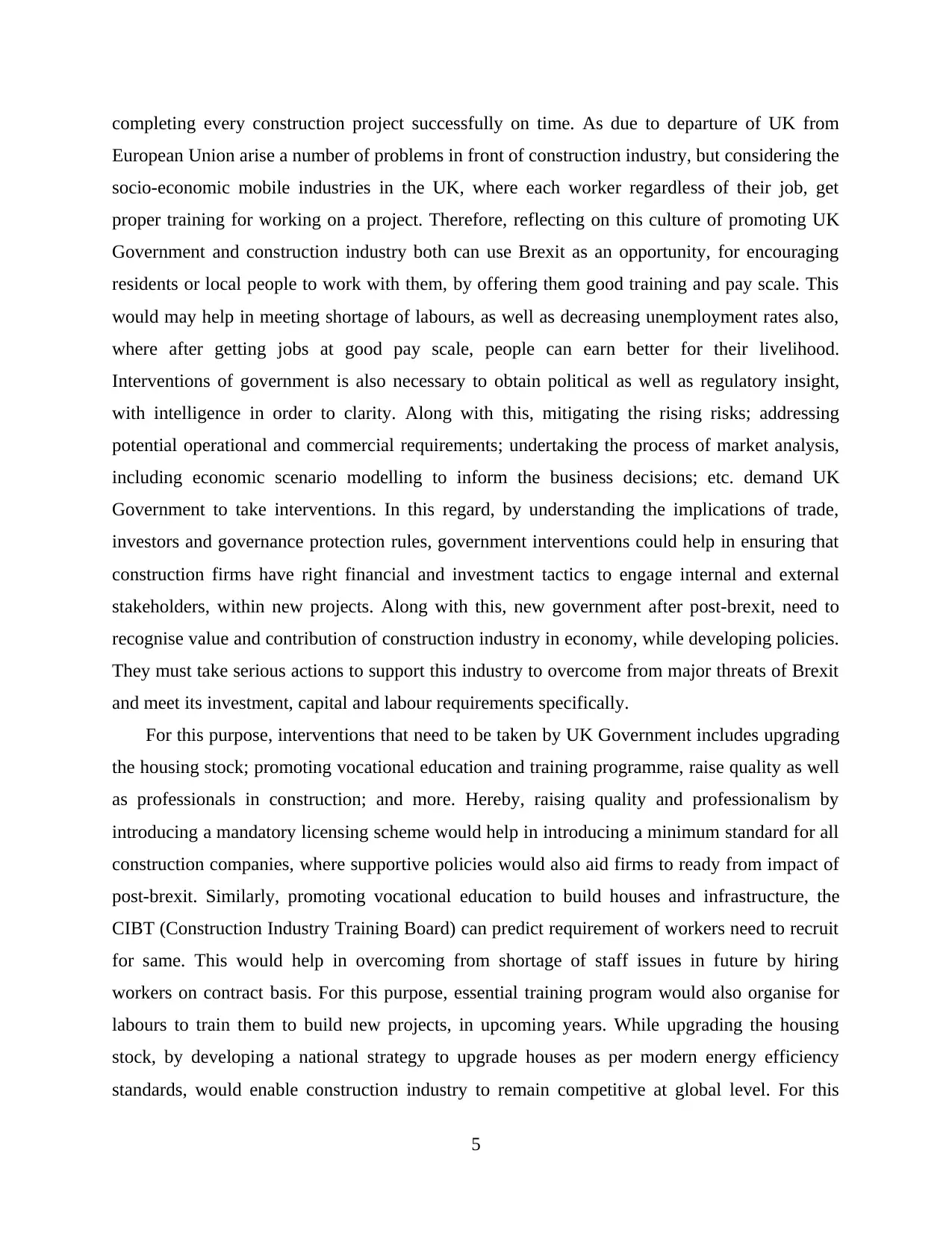
completing every construction project successfully on time. As due to departure of UK from
European Union arise a number of problems in front of construction industry, but considering the
socio-economic mobile industries in the UK, where each worker regardless of their job, get
proper training for working on a project. Therefore, reflecting on this culture of promoting UK
Government and construction industry both can use Brexit as an opportunity, for encouraging
residents or local people to work with them, by offering them good training and pay scale. This
would may help in meeting shortage of labours, as well as decreasing unemployment rates also,
where after getting jobs at good pay scale, people can earn better for their livelihood.
Interventions of government is also necessary to obtain political as well as regulatory insight,
with intelligence in order to clarity. Along with this, mitigating the rising risks; addressing
potential operational and commercial requirements; undertaking the process of market analysis,
including economic scenario modelling to inform the business decisions; etc. demand UK
Government to take interventions. In this regard, by understanding the implications of trade,
investors and governance protection rules, government interventions could help in ensuring that
construction firms have right financial and investment tactics to engage internal and external
stakeholders, within new projects. Along with this, new government after post-brexit, need to
recognise value and contribution of construction industry in economy, while developing policies.
They must take serious actions to support this industry to overcome from major threats of Brexit
and meet its investment, capital and labour requirements specifically.
For this purpose, interventions that need to be taken by UK Government includes upgrading
the housing stock; promoting vocational education and training programme, raise quality as well
as professionals in construction; and more. Hereby, raising quality and professionalism by
introducing a mandatory licensing scheme would help in introducing a minimum standard for all
construction companies, where supportive policies would also aid firms to ready from impact of
post-brexit. Similarly, promoting vocational education to build houses and infrastructure, the
CIBT (Construction Industry Training Board) can predict requirement of workers need to recruit
for same. This would help in overcoming from shortage of staff issues in future by hiring
workers on contract basis. For this purpose, essential training program would also organise for
labours to train them to build new projects, in upcoming years. While upgrading the housing
stock, by developing a national strategy to upgrade houses as per modern energy efficiency
standards, would enable construction industry to remain competitive at global level. For this
5
European Union arise a number of problems in front of construction industry, but considering the
socio-economic mobile industries in the UK, where each worker regardless of their job, get
proper training for working on a project. Therefore, reflecting on this culture of promoting UK
Government and construction industry both can use Brexit as an opportunity, for encouraging
residents or local people to work with them, by offering them good training and pay scale. This
would may help in meeting shortage of labours, as well as decreasing unemployment rates also,
where after getting jobs at good pay scale, people can earn better for their livelihood.
Interventions of government is also necessary to obtain political as well as regulatory insight,
with intelligence in order to clarity. Along with this, mitigating the rising risks; addressing
potential operational and commercial requirements; undertaking the process of market analysis,
including economic scenario modelling to inform the business decisions; etc. demand UK
Government to take interventions. In this regard, by understanding the implications of trade,
investors and governance protection rules, government interventions could help in ensuring that
construction firms have right financial and investment tactics to engage internal and external
stakeholders, within new projects. Along with this, new government after post-brexit, need to
recognise value and contribution of construction industry in economy, while developing policies.
They must take serious actions to support this industry to overcome from major threats of Brexit
and meet its investment, capital and labour requirements specifically.
For this purpose, interventions that need to be taken by UK Government includes upgrading
the housing stock; promoting vocational education and training programme, raise quality as well
as professionals in construction; and more. Hereby, raising quality and professionalism by
introducing a mandatory licensing scheme would help in introducing a minimum standard for all
construction companies, where supportive policies would also aid firms to ready from impact of
post-brexit. Similarly, promoting vocational education to build houses and infrastructure, the
CIBT (Construction Industry Training Board) can predict requirement of workers need to recruit
for same. This would help in overcoming from shortage of staff issues in future by hiring
workers on contract basis. For this purpose, essential training program would also organise for
labours to train them to build new projects, in upcoming years. While upgrading the housing
stock, by developing a national strategy to upgrade houses as per modern energy efficiency
standards, would enable construction industry to remain competitive at global level. For this
5

purpose, new policies to achieve zero carbon emission from construction also need to be
developed.
6
developed.
6
⊘ This is a preview!⊘
Do you want full access?
Subscribe today to unlock all pages.

Trusted by 1+ million students worldwide
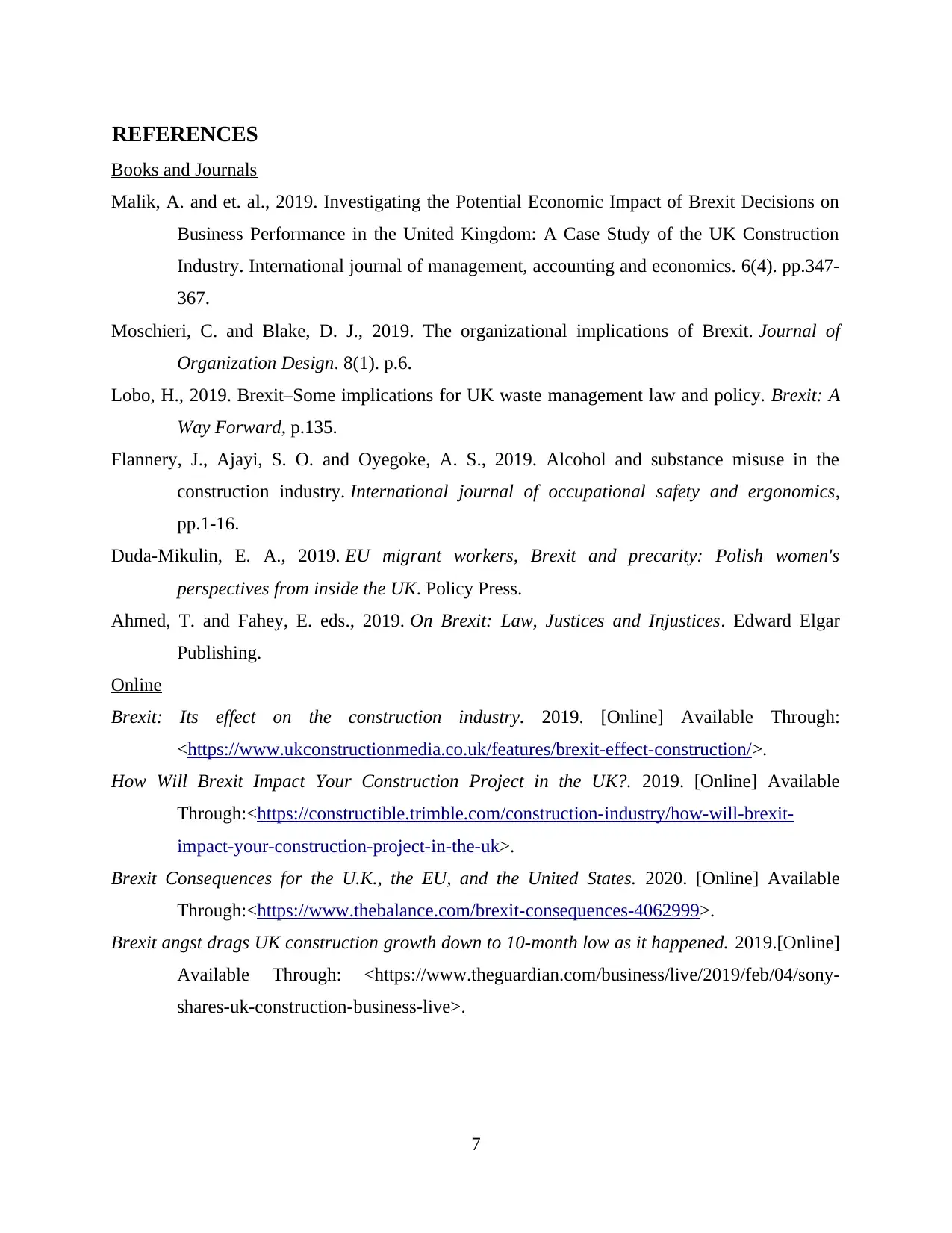
REFERENCES
Books and Journals
Malik, A. and et. al., 2019. Investigating the Potential Economic Impact of Brexit Decisions on
Business Performance in the United Kingdom: A Case Study of the UK Construction
Industry. International journal of management, accounting and economics. 6(4). pp.347-
367.
Moschieri, C. and Blake, D. J., 2019. The organizational implications of Brexit. Journal of
Organization Design. 8(1). p.6.
Lobo, H., 2019. Brexit–Some implications for UK waste management law and policy. Brexit: A
Way Forward, p.135.
Flannery, J., Ajayi, S. O. and Oyegoke, A. S., 2019. Alcohol and substance misuse in the
construction industry. International journal of occupational safety and ergonomics,
pp.1-16.
Duda-Mikulin, E. A., 2019. EU migrant workers, Brexit and precarity: Polish women's
perspectives from inside the UK. Policy Press.
Ahmed, T. and Fahey, E. eds., 2019. On Brexit: Law, Justices and Injustices. Edward Elgar
Publishing.
Online
Brexit: Its effect on the construction industry. 2019. [Online] Available Through:
<https://www.ukconstructionmedia.co.uk/features/brexit-effect-construction/>.
How Will Brexit Impact Your Construction Project in the UK?. 2019. [Online] Available
Through:<https://constructible.trimble.com/construction-industry/how-will-brexit-
impact-your-construction-project-in-the-uk>.
Brexit Consequences for the U.K., the EU, and the United States. 2020. [Online] Available
Through:<https://www.thebalance.com/brexit-consequences-4062999>.
Brexit angst drags UK construction growth down to 10-month low as it happened. 2019.[Online]
Available Through: <https://www.theguardian.com/business/live/2019/feb/04/sony-
shares-uk-construction-business-live>.
7
Books and Journals
Malik, A. and et. al., 2019. Investigating the Potential Economic Impact of Brexit Decisions on
Business Performance in the United Kingdom: A Case Study of the UK Construction
Industry. International journal of management, accounting and economics. 6(4). pp.347-
367.
Moschieri, C. and Blake, D. J., 2019. The organizational implications of Brexit. Journal of
Organization Design. 8(1). p.6.
Lobo, H., 2019. Brexit–Some implications for UK waste management law and policy. Brexit: A
Way Forward, p.135.
Flannery, J., Ajayi, S. O. and Oyegoke, A. S., 2019. Alcohol and substance misuse in the
construction industry. International journal of occupational safety and ergonomics,
pp.1-16.
Duda-Mikulin, E. A., 2019. EU migrant workers, Brexit and precarity: Polish women's
perspectives from inside the UK. Policy Press.
Ahmed, T. and Fahey, E. eds., 2019. On Brexit: Law, Justices and Injustices. Edward Elgar
Publishing.
Online
Brexit: Its effect on the construction industry. 2019. [Online] Available Through:
<https://www.ukconstructionmedia.co.uk/features/brexit-effect-construction/>.
How Will Brexit Impact Your Construction Project in the UK?. 2019. [Online] Available
Through:<https://constructible.trimble.com/construction-industry/how-will-brexit-
impact-your-construction-project-in-the-uk>.
Brexit Consequences for the U.K., the EU, and the United States. 2020. [Online] Available
Through:<https://www.thebalance.com/brexit-consequences-4062999>.
Brexit angst drags UK construction growth down to 10-month low as it happened. 2019.[Online]
Available Through: <https://www.theguardian.com/business/live/2019/feb/04/sony-
shares-uk-construction-business-live>.
7
Paraphrase This Document
Need a fresh take? Get an instant paraphrase of this document with our AI Paraphraser

8
1 out of 11
Related Documents
Your All-in-One AI-Powered Toolkit for Academic Success.
+13062052269
info@desklib.com
Available 24*7 on WhatsApp / Email
![[object Object]](/_next/static/media/star-bottom.7253800d.svg)
Unlock your academic potential
Copyright © 2020–2026 A2Z Services. All Rights Reserved. Developed and managed by ZUCOL.





